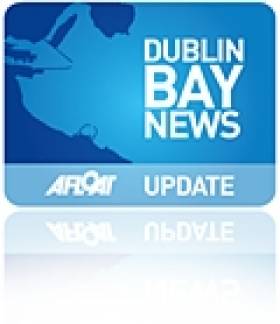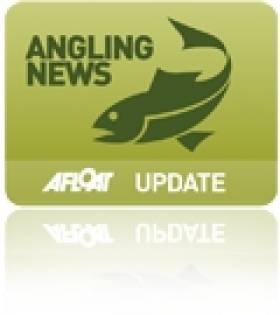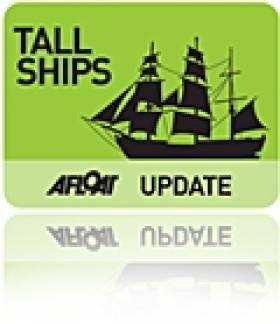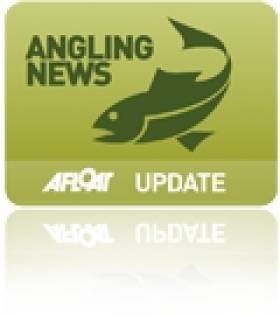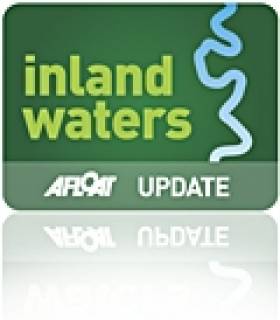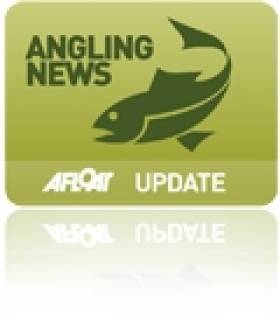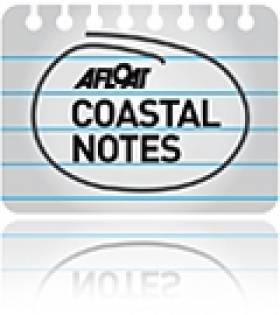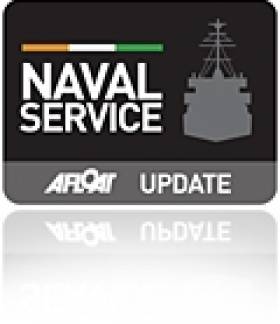Displaying items by tag: River Liffey
Weather Won't Dampen FlightFest On River Liffey This Sunday
#FlightFest - Though the weather forecast isn't looking great for the day, organisers of FlightFest on the River Liffey say the full schedule is proceeding as planned for this Sunday 15 September.
The once-in-a-lifetime aviation celebration, in conjunction with The Gathering 2013, will see more than 30 aircraft - old and new - take part in a spectacular low-level fly past to dazzle onlookers in Dublin's Docklands
Thousands are expected to line the quays between the Custom House and Dublin Port for the event on Sunday afternoon from noon till 6pm - which is set to feature the world's largest commercial airliner, the Airbus A380. The full running order of displaying aircraft is available HERE.
As reported yesterday on Afloat.ie, Dublin Bay Cruises is offering a special sailing up the Liffey to get an even closer view of the fly past at the East Link Bridge.
FlightFest is also set to be the last 'farewell' for retiring Naval Service vessel LE Emer, which will be on official patrol duties on the day.
New Regulations For Salmon Anglers As Season Begins
#Angling - The Irish Times' angling correspondent Derek Evans welcomes the start of the salmon angling season tomorrow with a look at regulation changes for 2013.
Among them he notes that the number of open fisheries has risen to 55, while 59 rivers - five fewer than last year - will be closed, which marks some progress in Inland Fisheries Ireland's (IFI) efforts to ensure sustainability of Ireland's freshwater fish stocks.
Meanwhile, the catch and release programme has been modified to encompass the River Liffey from Islandbridge to Leixlip Dam for the first time, although at 32 the scheme includes two fewer rivers than last year.
"Catch and release will maintain, among other things, club membership interest and ensure a good footfall on the riverbank," writes Evans.
"Provided catch and release protocols are practised correctly, research has shown that the survival rate can be close to 100 per cent."
The Irish Times has more on the story HERE.
Body of Woman Recovered from Liffey in Dublin City Centre
#NEWS UPDATE - The body of a woman was taken from the River Liffey in Dublin city centre last night (29 November), as The Irish Times reports.
The woman, understood to be in her mid-30s, was seen entering the water at O'Connell Bridge around 8.45pm and was recovered by Dublin Fire Brigade river rescue specialists around five minutes later.
It's thought the woman may have died from a heart attack.
A passer-by who made an unsuccessful rescue bid did not require serious medical attention.
Join the Allianz All-Aboard Liffey Cruise For Just €1
#TALL SHIPS - Celebrating the arrival of the Tall Ships to Dublin, the Allianz All-Aboard Liffey Cruise for St Michael's House invites the public to join its maiden voyage of the River Liffey next weekend 23-26 August for just €1.
The unique tour of the city includes a cruise along the Liffey to the new developments at Docklands and the IFSC, and will get you up close and personal with the Tall Ships at Dublin Port - which begin arriving in the capital over the next few days for this year's festival.
Hosting what promises to be fun day out for all ages will be Allianz’s very own Captain Pete, who will be handing out treats to the younger - and not so young! - seafarers on board.
And what's more, your euro will go towards the great work done by St Michael's House for people with intellectual disabilities. St Michael's House is Allianz's chosen charity this year - find out more about its work.
The tour normally costs €12.60 but a limited number of places are available for booking for just €1 via the Allianz All-Aboard Facebook app HERE. Early booking is advised to avoid disappointment. See terms and conditions.
Lecture: The Very Strange Tale of the Ouzel Galley
#MARITIME LECTURES – This weeks 'Thursday' Night Talk organised by the Dun Laoghaire Motor Yacht Club (DMYC) is indeed about the very strange tale of the "Ouzel Galley".
Not many folk are aware that Dublin had its own maritime mystery that ranks with the Marie (Mary) Celeste saga.
In 1625 the Ouzel Galley sailed out the River Liffey bound for Mediterranean waters. After an absence of five years she returned battered and bruised confounding locals who had presumed she was lost with all hands.
It was not the unexpected return that caused excitement at the time but the contents of her hold!...Tim Magennis shall reveal more of this extraordinary story on the evening starting at 8pm.
Thursday's (9th February) talk is part of a winter series held at the DMYC and is open to non members who are most welcome. The club located on the West Pier, Dun Laoghaire Harbour is close to Salthill DART station. To contact the club Tel: 280 1371 and visit www.dmyc.ie
Special Angling Event Produces First Salmon of 2012
#ANGLING - The first wild Atlantic spring salmon of 2012 was caught Sunday on the River Liffey in exceptional circumstances, The Irish Times reports.
Though the river is closed for salmon fishing as stocks are currently below sustainable levels, Inland Fisheries Ireland sanctioned a special catch-and-release club event for survey reasons at Islandbridge in the capital.
Declan Briggs – a 47-year veteran of the Dublin and District Salmon Anglers' Association - landed the 8.5lb beauty using a wooden Devon lure at 9.50am.
“This is my first time to catch the first fish. I’m absolutely delighted," he said.
Elsewhere in Ireland, Briggs' catch was mirrored by Tyrone man Ian Martin, who caught the northern region's first salmon on the year on the River Drownes near Bundoran.
The Irish Times has more on the story HERE.
Fond Memories of Guinness Barges on the Liffey
#INLAND WATERWAYS - As Derek Evans writes in The Irish Times, the recent discovery of the first Guinness merchant vessel - sunk a century ago by a German torpedo in the Irish Sea - rekindled memories of the brewery's boats on the Liffey in the 1950s.
He writes: "Living close to Stoneybatter, I often took time to stand on Queen Street Bridge as the barges, filled with Guinness barrels, slowly made their way from James’s Gate to Sir John Rogerson’s Quay.
"I remember clearly the skipper standing beside the open wheelhouse in his navy blue polo-neck jumper, captain’s hat and pipe... The skipper always had a smile and a wave before he would disappear for a few moments under the white cloud."
He also recalls the hoisting of the barrells at Butt Bridge onto the Guinness cargo vessels - like the WM Barkley, the Lady Grania or Gwendolen Guinness - for transport to Liverpool.
As previously reported on Afloat.ie, the wreck of the WM Barkley was captured in high-resolution images taken from the national research vessel RV Celtic Voyager off the coast of Dublin.
The Irish Times has more on the story HERE.
Tribute to River Liffey Salmon Pioneer
#ANGLING - A plaque paying tribute to the late secretary of the Dublin Salmon Anglers' Association has been inveiled at Carton Estate in Co Kildare.
Patrick 'Pat' O'Molloy, who died in November last year, was commemmorated for his pioneering work over the last 35 years in the rehabilitation and restoration of wild salmon stock in the River Liffey, The Irish Times reports.
This involved introducing micro-tagged smolts into the Rye, a tributary of the Liffey upriver of the Carton Estate weir which was impassable from further downstream.
Sadly O'Molloy died before the return of salmon to the Liffey in a year that also saw their return to the Tolka afer more than a century.
Former fisheries CEO Alan McGurdy said at the ceremony: "As you all know, Pat was an angler, a board member, environmentalist, fish farmer and most of all, a friend.
"Today is some recognition to the great man for the tremendous work he did to look after our fish."
Tanker and Lifeboats Conduct Emergency Exercises off Dalkey Island
Crew kitted in similarly bright orange coloured sea safety-survival suits entered the lifeboat before it plunged into the water. The activity was observed through the binocular-scope which overlooks Coliemore Harbour with excellent views across the sound to Dalkey Island, Dublin Bay and Howth Peninsula.
The binocular-scope does not require payment to operate and was unveiled in 2008 in memory of local resident the late Dr. John de Courcy Ireland, the 'father' of maritime Ireland (to read more click HERE). He was for 26 years a honorary secretary of the local RNLI station in Dun Laoghaire and a staunch campaigner of Irish maritime affairs.
Each Monday a routine lifeboat practice is conducted by the 47ft Trent class ALB (all-weather lifeboat) RNLB Anna Livia (info and PHOTO). Last night's drill also involved the new D-class ILB (inshore lifeboat) RNLB Réalt na Mara which was named earlier this year by Kathy Kenny, wife of RTE presenter Pat Kenny.
Under the cover of darkness the crew of the ILB Realt na Mara simulated an 'injured casualty' on the island where the casualty was prepared to be taken off by stretcher from the island's small harbour. From there the casualty was transferred to the larger RNLB Anna Livia which lay offshore. During the exercise, powerful searchlight beams from the ALB provided essential light to assist in the transfer operation.
Asides the lifeboats, there is plenty of wildlife to observe on the rocky outcrops at Maiden Rock, Clare Rock and Lamb Island, which forms the second largest island after the main island of 22-acres, where a resident herd of goats have been part of the local community for over 200 years.
As for the South Korean built Cumbrian Fisher, she too has close connections with these waters as she was named in Dublin Port in 2005. She is a frequent caller to Dublin bringing bulk liquid products from the oil refinery in Milford Haven, Pembrokeshire which is a major supplier, serving the demands of the capital.
Dublin Port has two oil jetties which cater for four tankers, where bitumen, chemicals, liquid petroleum gases, molasses and oil are handled on a 41-hectare zone with storage for 330,000 product tonnes to include 6,000 tonnes of LPG. In addition aviation fuel is frequently delivered to the terminal to satisfy the constant demand for aircraft using Dublin Airport.
Cumbrian Fisher alongside her sister Clyde Fisher where built for James Fisher & Sons and in recent years they have tended to take anchorage off Dalkey Island and off the Nose of Howth. In comparison the vast majority of vessels anchor in Dublin Bay which is divided into quadrants for the purposes of anchorage allocation.
Before the completion of the South Wall in Dublin Port, which considerably improved safer access of vessels entering the River Liffey, it was the relative deeper and sheltered waters of Dalkey Sound which were used instead as Dalkey acted as the principle port for Dublin between 14-17th centuries.
Vessels would convey cargoes which were taken to and fro by lighter to the coast where it was carried by horse and cart to nearby Dalkey before onward travel across the exposed plains to Dublin City.
To learn more about Dalkey's medieval maritime heritage with its relationship with the capital of Dublin in addition the use of Dalkey Quarry in the construction of (Kingstown) Dun Laoghaire Harbour, visit the Dalkey Castle & Heritage Centre. To read more go to www.dalkeycastle.com in addition to further information about Dalkey including the local community council newsletters click HERE.
- Dublin Bay
- Dublin Airport
- Dublin Bay News
- Commissioners of Irish Lights
- Irish Lights
- coliemore harbour
- Pembrokeshire
- Dalkey Island
- Port of Dublin
- River Liffey
- Ports and Shipping News
- The Muglins
- Coastal Notes
- Howth Peninsula
- Pat Kenny
- Dalkey Sound
- Lighthouse news
- Irish Lighthouses
- Cumbrian Fisher
- Jas Fisher & Sons
- Clyde Fisher
- Milford Haven Oil Refinery
- Dalkey Castle & Heritage Centre
- Dr. Ireland
- Dr. John de Courcy Ireland
- Irish maritime historian
- Kingstown Harbour
- Kathy Kenny
- RTE presenter Pat Kenny
- South Wall Dublin Port
- Medieval Dalkey
- Dalkey Quarry
- Aviation fuel
- Dalkey Tidy Towns Committee
- Nose of Howth
- Dublin Port Oil Jetty Terminal
- Dalkey Community Council
- Dalkey Island Goats
It is only in recent years that larger vessels can berth at this stretch of the waterfront following the completion of several major construction projects over the last decade. From the building of the Convention Centre and the Samuel Beckett Bridge which involved using the dredger Hebble Sand (click HERE) during its construction process.
In addition the refurbishment of Spencer Dock sea-lock entrance that for many years was closed is now re-opened. The dock entrance featured in the start of the new television series 'Waterways'-The Royal Canal. Episode two is this Sunday on RTE 1 at 8.30pm.
Aside the 79m L.E. Roisin, the last large vessel to berth close to berth 16A was the French 58m tallship Belem, which was chartered by Alliance Francaise to celebrate their 50th anniversary in 2010 and for the inaugural French Hoist the Sail: Market Festival. The three-masted barque built in 1896 was once also owned by the Sir Arthur Ernest Guinness under the name of Fantôme II.
Situated between where L.E. Roisin is currently berthed and where the Belem had moored, is home to the 'resident' M.V. Cill Airne, a floating bar and restaurant dining venue at berth 16B. Another resident is the former lightship Kittiwake at berth 17B, though sited much further downstream at the end of North Wall Quay, opposite the O2 Arena and next to the East-Link Bridge.
There is a fourth resident, again berthed on the north quays, though the Jeanie Johnston unlike her counterparts is moored closer to the city-centre at Custom House Quay. Apart from yachts, leisure-craft and occasional private motor-yachts using the Dublin City Moorings, she is the only vessel to permanently occupy a berth between Samuel Beckett Bridge and the Sean O'Casey foot-bridge.
- inland waterways
- Dublin Port
- Dublin Docklands
- Royal Canal
- Jeanie Johnston
- naval service
- Custom House Quay
- Alliance Française
- Spencer Dock
- Sean O'Casey Bridge
- River Liffey
- Belem
- Sir John Rogersons Quay
- TallShips
- North Wall Quay
- Fantome II
- Dick Warner
- Dublin City Moorings
- Navy News
- O2 Arena
- EastLink bridge
- LE Roisin
- Sir Arthur Guinness
- National Convention Centre Dublin
- Samual Beckett Bridge


























